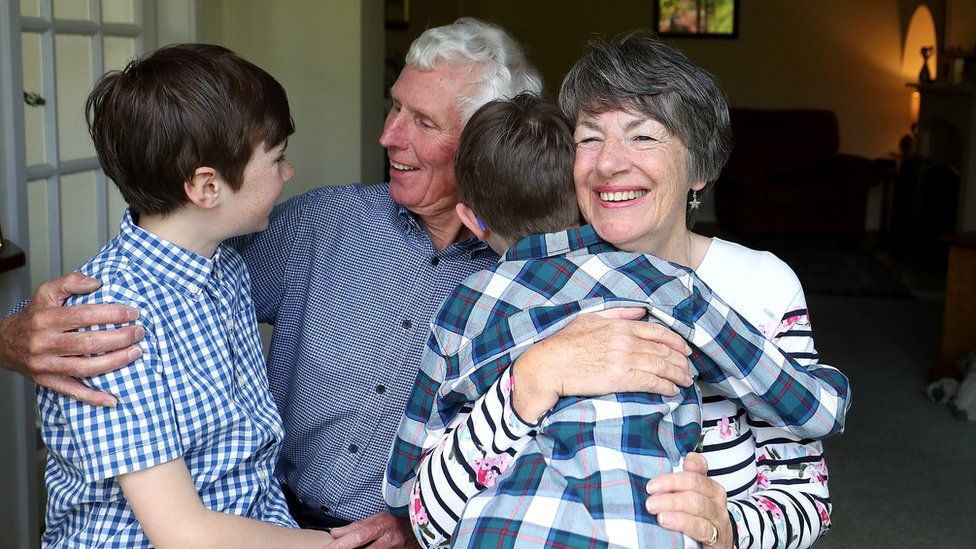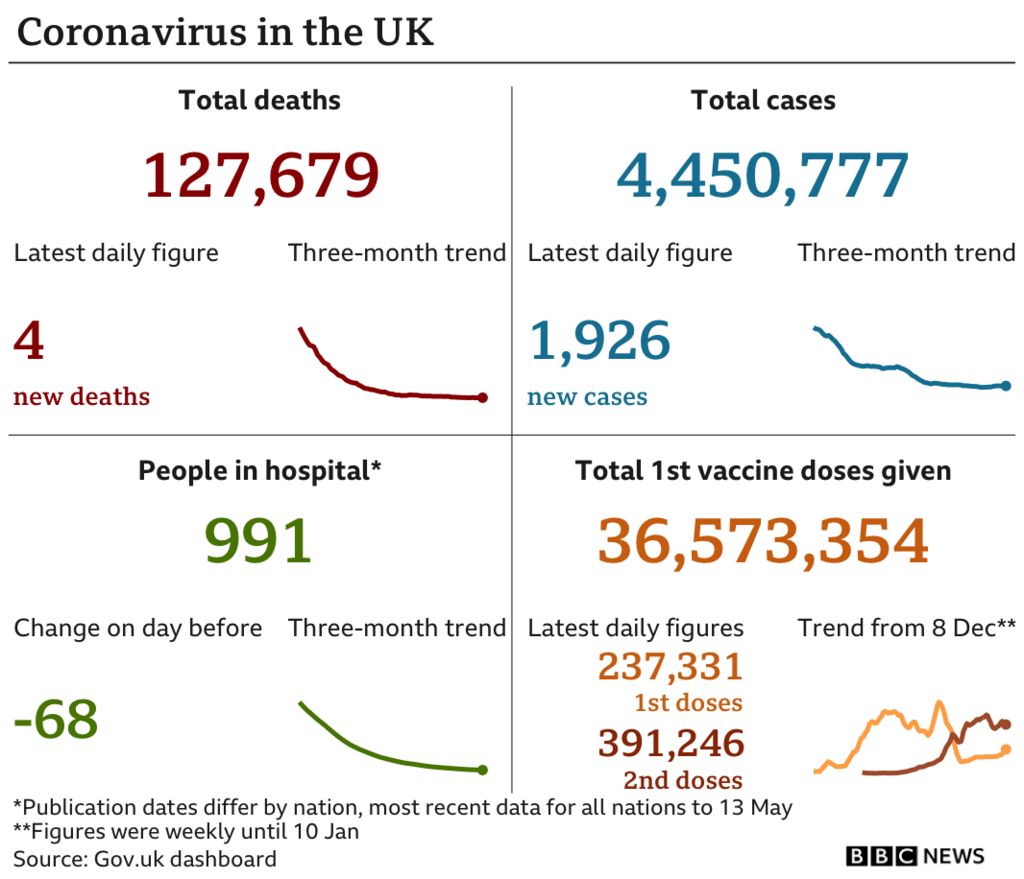
People must continue to play their part in stopping coronavirus, Boris Johnson has said, as lockdown rules ease in England, Wales and most of Scotland.
Millions can now socialise indoors in limited numbers, hug loved ones and visit pubs and restaurants indoors.
The ban on foreign travel has also been lifted and replaced with new rules.
Mr Johnson said: "We have reached another milestone in our road map out of lockdown, but we must take this next step with a heavy dose of caution."
The rule changes come as the variant first identified in India continues to spread in the UK, with mass testing rolled out to hotspots such as Bolton in Greater Manchester and parts of London, Sefton and Worcestershire.
Sir Jeremy Farrar, a member of the government's independent scientific advisory group Sage, said the lifting of the rules was the "most difficult policy decision of the last 15 months or so. It is very, very finely balanced."
He told BBC Radio 4's Today programme the variant, which is thought to be more transmissible, "is becoming dominant in parts of the UK, and yet vaccination across the country has been extraordinary successful".
"I think we will see an increase of cases and infections over the coming weeks as some of the restrictions are lifted, but the key question is whether we have decoupled increased transmission in the number of people who do get infected from the number of people who get ill and need to go to hospital."
While lockdowns are easing across England, Scotland and Wales, the changes are different in each nation. Two areas of Scotland - Glasgow and Moray - will not have their rules eased after a spike in cases.
In a statement issued on Sunday evening on the lifting of the rules in England, Mr Johnson added: "Everyone must play their part by getting tested twice a week, coming forward for your vaccine when called, and remembering hands, face, space and fresh air.
"I urge everyone to be cautious and take responsibility when enjoying new freedoms today in order to keep the virus at bay."
Anyone in England and Scotland can order free lateral flow tests - which give results in 30 minutes - even if they do not have symptoms. In Wales and Northern Ireland, they are available for certain people, such as those who cannot work from home.

How have the rules changed?
England:
- People can now meet indoors in groups of up to six or two households, or in groups of up to 30 outdoors. Overnight stays are allowed
- Pubs, bars and restaurants can serve customers indoors
- Museums, cinemas, children's play areas, theatres, concert halls and sports stadiums can all reopen, as can hotels
- Social distancing guidance is changing and contact with other households like hugs is a matter of personal choice
Scotland (except Glasgow and Moray):
- People can meet indoors in groups of six from up to three households. Outdoors, up to eight people from eight households can mix
- Pubs and restaurants can serve alcohol indoors until 22:30
- Entertainment venues such as cinemas, theatres and bingo halls can reopen and up to 100 people are allowed at indoor events
Wales:
- Pubs and restaurants can reopen indoors and customers can meet in groups of up to six from six households
- All holiday accommodation can reopen
- Cinemas, bowling alleys, museums, galleries and theatres can reopen
- No change to indoor socialising - this is still restricted to extended households where two households can mix with each other and have physical contact
And in all three nations, foreign holidays are allowed.
Northern Ireland will review lockdown rules on 20 May, with the hope that some could be lifted on 24 May.


This is a big moment for the national mood and the UK economy - particularly those sectors that have been hardest hit by the restrictions.
Nearly a million hospitality and leisure workers will go back to work today, according to industry estimates.
Although many have been open for outside service, 60% of hospitality venues have no outside space and have been unable to open until now.
However, this is not the champagne moment many had hoped for.
The real prize for hospitality businesses is the planned removal of all restrictions on 21 June.
Recent government warnings about the threat posed to these plans by the Indian variant are casting an unwelcome cloud of uncertainty.
Even with today's easing of restrictions, many businesses will be unable to operate at anywhere near pre-pandemic capacity.
They will face the prospect of deferred rent bills, the repayment of Covid loans and an increasingly acute staff shortage - with hospitality workers who have left the industry not yet feeling confident enough to return.

Scientists believe the Indian variant does spread more easily, but early data suggests vaccines still work. However, the exact impact on vaccine efficacy - if any - is still to be firmed up.
At the weekend, the British Medical Association - which represents doctors - said it was a "real worry" that the easing was still going ahead while the Indian variant was spreading and many younger people were not vaccinated.
Mr Johnson said the government was keeping the variant "under close observation" and "taking swift action where infection rates are rising".


Ministers and senior advisers are concerned due to continued uncertainty about the Indian variant, including how much faster it spreads than the UK variant.
The impact on hospital numbers in communities most affected by the variant will be studied closely this week and next.
Officials were preparing anyway to monitor the consequences of today's easing of restrictions, the biggest step so far - with people mixing more and case numbers likely to rise.
Preliminary laboratory data from Oxford University suggest, according to ministers, that vaccines will be effective against the Indian variant - but they stress that there's a race to keep the vaccination programme ahead of the virus.
Within the next few days, a first dose will be offered to all those aged 35 and over in England.


The latest government figures show a further 1,926 Covid cases have been recorded in the UK, while a further four people have died.
The number of people in the UK who have received a first dose of the vaccine has now topped 36.5 million, while the number of second doses given is at 20.1 million.
Also from Monday, people travelling abroad will be able to use the NHS app - which is different to the NHS Covid-19 app - to prove they have had the vaccine.
Transport Secretary Grant Shapps previously said people will be able to use the app at border controls, although the government says people should still check countries' entry requirements as tests or quarantine might still be needed.
Speaking to the BBC on Sunday, Health Secretary Matt Hancock defended the easing of lockdown rules on Monday, and said the government's strategy was to "replace the restrictions with vaccination" as the first line of defence against the virus.

- LOOK-UP TOOL: How many cases in your area?
- YOUR QUESTIONS: We answer your queries
- VACCINE: When will I get the jab?
- NEW VARIANTS: How worried should we be?



Will you be socialising indoors and hugging loved ones you don't live with? Tell us your your plans by emailing: haveyoursay@bbc.co.uk.
Please include a contact number if you are willing to speak to a BBC journalist. You can also get in touch in the following ways:
- WhatsApp: +44 7756 165803
- Tweet: @BBC_HaveYourSay
- Upload your pictures/video here
- Or fill out the form below
- Please read our terms & conditions and privacy policy
If you are reading this page and can't see the form you will need to visit the mobile version of the BBC website to submit your question or comment or you can email us at HaveYourSay@bbc.co.uk. Please include your name, age and location with any submission.

- MOTHERLAND: Comedy navigating the trials and traumas of parenting
- RACISM IN THE MUSIC INDUSTRY: Little Mix's Leigh-Anne confronts her own experiences

https://news.google.com/__i/rss/rd/articles/CBMiJGh0dHBzOi8vd3d3LmJiYy5jb20vbmV3cy91ay01NzEzNjE0MNIBAA?oc=5
2021-05-17 06:57:55Z
52781599704020
Tidak ada komentar:
Posting Komentar